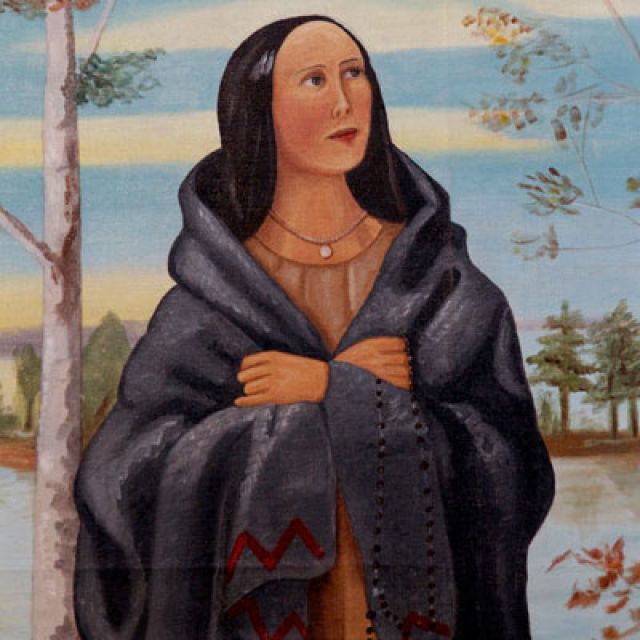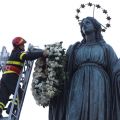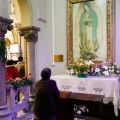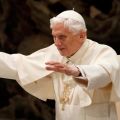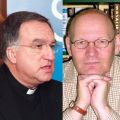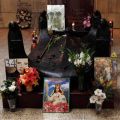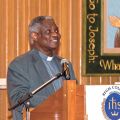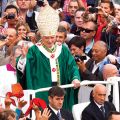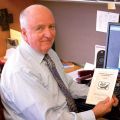Message for the 2012 Day of Prayer in Solidarity with Indigenous People
In response to an invitation earlier this year by the Canadian Catholic Aboriginal Council
Gospel is good news of freedom from sin, selfishness, death, Pope says
ROME - In the immaculate conception of Mary, Christians recognize the
Our Lady of Guadalupe's devotion extends beyond the Americas
MEXICO CITY - Ana Rita Valero received an unlikely request in 2008. Valero, an anthropologist and president of the Archconfraternity of Our Lady of Guadalupe, was asked by an official with the Mexican consulate in Shanghai to send two large images of Our Lady of Guadalupe.
Catholic beliefs are not open to popular vote, pope says
VATICAN CITY - When the Catholic Church affirms the importance of how all the faithful understand matters of faith and morals, it is not saying Catholic beliefs are open to a popular vote, Pope Benedict XVI said.
Brampton parish opens conversation on Church for Year of Faith
BRAMPTON, ONT. - St. Anne’s Church in Brampton is offering parishioners the chance to re-examine their catechetical teachings during the Year of Faith through a series of guest speakers who’ll engage them in deep philosophical conversation.
“It is difficult to have adult catechism so I thought that this year is a great opportunity to bring that sense of adult catechetical formation here,” said pastor Fr. James Cherickal. “What people hear from the Toronto Star or the CBC or Cable Pulse 24, many of our Catholics think that whatever they say is the truth. So we need to let people know exactly what the Church’s concerns are for these kinds of issues.”
Over the next year the parish will host speakers on the second and third Wednesday of the month to address a variety of topics, including evangelical questions, treasures of the Catholic Church and the Church in media. Following the talks parishioners will have a chance to chime in with their own specific questions for the experts.
Among the notables slotted to speak are Fr. Tom Lynch, national director of Priests for Life, journalist and Register columnist Michael Coren and Salt + Light TV CEO Fr. Tom Rosica. Cardinal Thomas Collins will celebrate the closing Mass next November.
“They are all very comfortable in taking questions because these are their fields of expertise and these are the things that they usually deal with,” said Cherickal. “These are the people who have both intellect and the calling of the theme which they try to live in their life.”
In addition to the speakers the parish will also be offering eucharistic adoration services from 7 p.m. to midnight, with confessions starting at 10 p.m., on the first Friday of each month. Months will close off with another learning opportunity, Apostolic Letters and Teaching of the Church, on the final Friday run primarily by Fr. Ephram Nariculam.
With so much happening it should be no surprise there were challenges in organizing everything.
“Because St. Anne’s is a very, very active and vibrant parish, it was very difficult to find the time. There (needed to be some) consistency in order for the people to remember the programs are going on,” said Cherickal. “By the grace of God everything worked together.”
The Year of Faith Committee was instrumental in organizing the events, said Cherickal. Organized shortly after Cherickal came to the parish in July, the committee first met in late September to brainstorm ideas on how to best celebrate the Year of Faith.
“Fr. James wanted to do something to kind of allow the adults in the parish to have opportunities to hear talks and opportunities to deepen their faith,” said committee member Dwight Stead. “Very quickly the slate of speakers emerged.”
As an academic consultant for the Dufferin-Peel Catholic District School Board, Stead sees the average parishioner’s limited understanding of the Church’s teachings on a regular basis. It is this reason that, when asked by Cherickal to join the committee, Stead immediately said yes.
“A lot of times adults go through the sacraments and then they kind of fall into a period of time when their faith isn’t really deepened,” he said. “They have a lot of catechism when they are a student but when you’re a student you can’t really grasp a lot of the deep philosophical messages that adults need to know about.”
While the intended audience is adults, both Stead and Cherickal encourage youth to attend — in fact they’ve planned a speaker for each day of Catholic Education Week who’ll address issues relevant to teens.
On Nov. 14 when the series kicked off with Fr. Joseph Singh, there was at least one teenager among the 100 or so who attended and now she plans to attend as many talks as possible.
“I thought it was going to be boring. I just thought the priest was going to be reading off a piece of paper,” said 17-year-old Yesennia Guzman, who’s mother insisted she attend.
“I feel that after that session that it is necessary for myself to go every week to learn something more about the faith. I learned how ignorant I was.”
For Guzman the information that she received that Wednesday night has helped her to deepen her faith and allows her to live the Eucharist fuller — the goal Cherickal had in mind when dreaming up the idea in the first place.
“The goal is to bring them more closer to Christ and the Church.”
Tourist route commemorates Romero
SAN SALVADOR - The Salvadoran government will open a tourist route in honour of Archbishop Oscar Romero, who was killed by death squads in March 1980.
The initiative, which will begin next year, aims to boost tourism in the country and at the same time remember the legacy of Archbishop Romero, a staunch defender of human rights and the poor who was hated by the military and oligarchs.
The tour should ensure that “his life and thought are known by foreign visitors and also by new generations of Salvadorans,” El Salvador President Mauricio Funes said from Archbishop Romero’s crypt in the Metropolitan Cathedral, where he announced the plan.
The route will include sites like the cathedral, where the archbishop denounced the injustices that occurred in this country in the late 1970s. On the steps of the cathedral, dozens of people participating in the archbishop’s funeral were massacred by government forces March 30, 1980.
It also will include the Romero Centre and Martyrs Museum, both on the campus of Central American University. They display objects belonging to the archbishop, to the Jesuits murdered in 1989 and to Jesuit Father Rutilio Grande, the first priest executed by death squads, in 1977.
The tour includes the Museum of the Word and Image and Divine Providence Hospital, where Archbishop Romero was shot dead while celebrating Mass.
The Truth Commission, created in 1993 to investigate political crimes committed during the 1980-92 civil war, established that Archbishop Romero’s assassination was carried out by a right-wing command led by Maj. Roberto D’Aubuisson, founder of Nationalist Republican Alliance. D’Aubuisson died of cancer in 1992.
Today’s Africa proof the old evangelization worked
TORONTO - The New Evangelization that anchors Pope Benedict XVI’s call for a Year of Faith looks a little different from an African perspective, Cardinal Peter Turkson told a capacity audience at the Regis College chapel in Toronto.
The Ghanaian cardinal who heads up the Pontifical Council for Justice and Peace delivered the Martin Royakers Lecture Sept. 26, speaking about “Vatican II: A Council of Justice and Peace.” He also spoke with The Catholic Register in an exclusive interview.
For African Catholics the New Evangelization is a challenge to form better leaders in the Church and society, and an invitation to deepen the commitment of all Christians to the body of Christ, Turkson said.
Since the Second Vatican Council the African Church has grown to a degree almost inconceivable to the Churches in North America and Europe, Turkson said. From 29 million Catholics in 1962 to 186 million today, Africa’s Catholic population has grown 541 per cent.
The old image of Africa as a mission land under the tutelage of European and North American priests and sisters is beginning to fade. Between 1962 and 2012 African- born priests have risen from just 15,000 to more than 40,000. Seminaries are bursting. There were 26,000 religious women from Africa in 1962, compared to 68,000 today.
Many Africans have become missionaries to underserved regions of Canada, the United States and Europe.
It seems that the old evangelization worked.
“We did teach people the catechism and we did baptize them,” Turkson told The Catholic Register.
But that doesn’t mean Africa doesn’t now need the New Evangelization — a concept first spoken about by Pope John Paul II at a meeting of the bishops of Latin America in Puebla, Mexico, in 1979.
Just as the majority of African Catholics trace their Catholic roots to the great ecumenical council of 1962-1965, the majority of African nations were released out of colonialism either just before or during Vatican II.
“The educated elite, the educated class that emerged in the emerging states, mostly was educated in mission schools,” pointed out Turkson.
Unfortunately they included corrupt politicians such as Zairian President Mobutu Sese Seko, who amassed a personal fortune of some $5 billion, and Robert Mugabe, still in power in Zimbabwe.
“That has caused several Church leaders in Africa to sit back and think, ‘What did we do wrong?’ ” said Turkson.
But it isn’t just the politicians and business leaders of the continent that worry African bishops. In Turkson’s native Ghana almost a quarter of the population is Pentecostal, compared to just 15 per cent who are Catholic. Many people opt for a simpler, more personal, more emotionally expressive brand of faith.
What’s missing in the merely intellectual and notional religion of Africa’s leaders and the purely personal religion of the poor is the social doctrine of the Church, Turkson said.
“But their social consciousness, what we now call the social doctrine of the Church, wasn’t taught much. That was missing. People became Christians but the transition — the fact they were Christian — did not impact much on their social lives. That is something we are now discovering,” he said.
Just recording baptisms won’t do any more. Nor will mere catechism lessons make Christians.
“That is not quite the experience of conversion,” he said. “The Evangelical movement is appealing more to the heart, with lively music, lively prayer, the power of the spiritual world.”
All of that is embedded in the Catholic way of living out the sacraments, but it has to be uncoveredand presented in new ways, said Turkson.
“We need to find a way of bringing it down to basically these needs — to people’s life situations,” he said. “All of that serves as vehicles of God’s grace.”
He believes Catholic parish life has to afford people more opportunities to bear witness and testify to their faith.
“The world is now looking for witnesses,” he said. “We don’t make it alive. We don’t make it come alive in such a way that it encourages them, motivates them, touches their lives in faith. It would be great if we fashioned a little space in our worship for moments like that.”
Synod to set vision for the new evangelization
The global Church is in Rome to talk about how it talks to the world. The topic is the new evangelization,meaning all the ways the Church presents Christ to the world and how we are all called to serve.
The Synod of Bishops on the New Evangelization for the Transmission of the Christian Faith is more than a distant talking shop for high Church officials. It also provides the keys to the Year of Faith which launched Oct. 11, the 50th anniversary of the Second Vatican Council.
It’s the 25th such synod since the close of Vatican II and runs Oct. 7 to 28.
There will be two English and two French bishops from Canada among the approximately 170 bishops chosen by bishops’ conferences around the the world. The Canadian Conference of Catholic Bishops elected to send Quebec City’s Archbishop Gerald Cyprien Lacroix, Antigonish Bishop Brian Dunn, St.-Hyacinthe Bishop Francois Lapierre and Nelson Bishop John Corriveau.
The voting members of the synod will also include 20 bishops from Eastern Catholic Churches, 25 bishops who work in the Vatican heading up various offices, 35 bishops named directly by the Pope and 10 representatives from religious orders chosen by the Union of Superiors General.
Regis College professor of theology Sr. Gill Goulding will be the Canadian among 49 theological experts assigned to assist the synod fathers and contribute to discussions. The theologians and thinkers don’t get to vote, but their contributions to discussions may substantially contribute to what the bishops vote on.
How the synod will be understood outside Vatican City may have a lot to do with another Canadian. Basilian Father Thomas Rosica, CEO of Salt + Light Catholic Media Foundation, will be the English-speaking press secretary for the duration of the synod.
Though there will be lots of talk about new media and the digital age, Fr. Steve Bossi doesn’t want the bishops to come back from Rome with a social media strategy or a new comfort level with smartphones.The new evangelization is about a lot more than technology or better media management, said the director of programs at Toronto’s Paulist Centre.
“They need to come back with a vision,” said Bossi. “They need to come back with a sense of what is the modern world and how does it function. Then, how do we speak our faith into that modern world?”
In the lineamenta or discussion paper for the synod prepared by Croatian Archbishop Nikola Eterovic, the Vatican identifies six ways the world has changed and made it more difficult to proclaim the Gospel in our times:
o “Profound secularism” has made it difficult for religion to be heard and understood. An overly secularized culture keeps people cocooned in self-interest. “Temptations to superficiality and self-centredness, arising from a predominating hedonistic and consumer-oriented mentality, arenot easily overcome,” said the lineamenta.
o Migration is pulling people out of their own cultural context and creating new cultures thathave few marks of permanence, “leaving little space for the great traditions of life, including thoseof religion.”
o Social communications have developed so rapidly the Church has been left wondering how toengage in the new global conversation. “The formation of a culture centred on passing novelties, thepresent moment and outward appearances, indeed a society which is incapable of remembering the past and with no sense of the future,” is an unwelcoming place for 2,000 years of tradition dedicated to a single transcendent reality.
o Economics has become as globalized as every other aspect of our lives. As the butterflies of globalization have emerged from the cocoons of national and local economies, markets have shed ethical constraints and forgotten their moral purposes.
o Science proposes a worldview that often seems as broad and hopeful as religion. “Science and technology are in danger of becoming today’s new idols.”
o Political life has changed massively since the fall of communism. Although the Church does not mourn the passing of an atheistic, materialist ideology, the triumph of markets, the emergence of violent and politicized appeals to religion in Asia and the Islamic world and the environmental crisis makes for a situation “frought with risks and new temptations of dominion and power.”
Eterovic’s six points seem like an overwhelmingly negative assessment of the world. It would be easy to incorrectly conclude that the new evangelization is about the Church standing in opposition to the modern age, retreating into an intellectual and emotional bunker constructed from comforting bits of its own history.
But the new evangelization is not about fear and loathing of the world, said Bossi.
“It’s part of our faith that we believe that the Holy Spirit moves through time and through human experience,” he said. “God has not abandoned us in this world and the Church doesn’t have to be out there somehow speaking against the modern world.”
Isaac Hecker, founder of Bossi’s Paulist order, would have recognized many of Eterovic’s challenges as his own in the United States of 150 years ago. Hecker was faced with a population of immigrant Catholics who had been knocked off the moorings of their traditional Catholic culture by the experience of migration. The 19th century was an age of wonders that made communication (telegraph) nearly instantaneous and travel(trains) rapid and cheap. Hecker responded by preaching and writing in the language of his times.
The Paulists today carry on their founder’s new evangelization with their own involvement in media and in adult education.
It’s not so much about which media carries the words as it is about the authenticity and honesty of the words, said Bossi. Attempts to carefully manage the media by sticking to an approved, prepared text are rarely persuasive in a culture that values honest, spontaneous responses.
“You don’t get that sense of speaking from the heart. And yet, what are people looking for?” asked Bossi. “They aren’t looking for data they can get into their head. They’re looking for someone who can speak to them at the level of human experience.”
The decree granting indulgences for the Year of Faith makes it clear Pope Benedict XVI has no intention of sending Catholics fleeing from the world.
“All the faithful, individually and in community, will be called to give open witness of their faith before others in the particular circumstances of daily life,” reads the Sept. 14 decree.
The Pope has also signaled that he views the new evangelization from an ecumenical perspective. On the personal invitation of Pope Benedict XVI, one of the first speakers at the synod on new evangelization will be the Anglican Communion’s scholarly leader Archbishop Rowan Williams. Williams was to address synod fathers Oct. 10.
“A new evangelization means that the Church must convincingly sustain her efforts at uniting all Christians in a common witness to the world of the prophetic and transforming power of the Gospel message,” reads Eterovic’s lineamenta.
In fact, the new evangelization does not begin with what the Church says to the world, or even how it says it. The starting point is what the Church is to the world and in the world.
“In the end, the expression new evangelization requires finding new approaches to evangelization so as ‘to be Church’ in today’s everchanging social and cultural situations,” reads the lineamenta.
As a theologian consulting with the bishops at the synod, it’s the existential hope of the Gospel as it is lived that Goulding wants to emphasize.
“In many ways it seems to me that the heart of the new evangelization lies in living radically the faith that we have,” she said.
Toronto students called to ‘ACCTS’
TORONTO - The Toronto Catholic District School Board, through its A Catholic Call To Service (ACCTS) program, is looking to expose students to the true meaning ofservice.
“It’s a program in which our students get an opportunity to witness, in action, their faith,” said Deb Gove, the board’s secondary resource person forreligious education. “It is a totally unbelievable experience for boththe students and the people (they help).”
ACCTS, which launches Oct. 17, will see 35 Catholic secondary schools across the city send 10 students into the downtown region to help out at a varietyof social assistance agencies. These agencies include shelters, missions and food distribution groups.
On the day of service, students meet and are divided into groups before heading off to the appropriate location. Everything is wrapped up around 7 p.m.following a liturgical service. But there is more to it than just a single day of service.
“It’s not just a day, it’s a taste of what service is like,” said Gove. “It’s life-long learning.”
Lasting about 10 hours, the day does not count towards the students’ compulsory 40 hours of community service for graduation in the Catholic system. The focusis on teaching students about the importance of helping others without any personal gain.
“If we’re just out there looking after each other and not looking after those who need it we’re not doing what Jesus asked us to,” said Gove.
“It’s important that we take care of the poor and vulnerable.” That’s a message which stuck with Raffi Degralstanian after participating in ACCTS last fall.
“I hadn’t actually had a good idea of what service was until I was actually there,” said the Grade 12 Brebeuf College School student. “It definitely opened my eyes to when people need service and how I should give it to them.”
Degralstanian was one of the students who helped clean up Mary’s House, a downtown women’s shelter, after it suffered significant damage from a fire.
The experience touched him so much that when the opportunity to participate in this year’s 15th anniversary program came, Degralstanian immediately wentonline to register.
“It was like wow, I did something here, I was able to contribute my physical being and apply it to this place and it made a difference,” said Degralstanian.
“Giving your sweat and being there physically doing something is much more meaningful than donating five or 10 bucks.”
When the group of 10, which included Degralstanian, returned to Brebeuf the following school day from their various assignments they instantly becamepivotal figures in establishing the school’s own Street Patrol program. Details of the school’s program, which is independent from ACCTS, are still beingdeveloped, but the objective is feeding the homeless at least once a month during the school year.
“It speaks a lot to the meaningful experience they receive on this given day,” said Robert Gregoris, Brebeuf chaplaincy team member.
“For a lot of them it is an eye opener. A lot of them don’t see the difficulties and the challenges that the human spirit goes through.” Although Gregoris said he understands the importance of the day’s message of unrewarded service he does think the students receive something in return — a closer connection with God.
“It’s a real tangible way where young people get to experience the message of Christ and the face of Christ,” said Gregoris.
“It gets to their heart, it gets to their soul.”
An escape from city life led to an unexpected call to serve the Church
MAYO, YUKON TERRITORY - When we moved to the Yukon almost four years ago, it wasn’t to work in the missions. I was employed as a schoolteacher and my wife Tina stayed home with our young son Johnathan. We moved to Mayo for adventure, change and reprieve from city life. It was not meant to be a long-termcommitment, nor working for the Church.
The village of Mayo has a population of a little more than 400 people, predominantly the Na Cho Nyak Dun First Nation. Although we did not move to the Yukon to work in the missions, it seems God had other plans.
Sr. Angela Shea of the Sisters of Notre Dame was resident administrator for Christ the King mission. She had been here almost 20 years where she led the Catholic community and was an integral part of the larger community. During our first year, there was talk of the 80-year-old sister leaving Mayo and retiring to her native Prince Edward Island. In talking with Whitehorse Bishop Gary Gordon, Tina and I expressed ourwillingness to serve the Church. With Sr. Angela leaving, the timing was good. Gordon asked if we would fill in as mission administrators. His need for missionworkers and our interest and desire to serve the Church came together, and we began discussing the transition, which took place in 2009.
There are about 47 Catholics in Mayo. Besides keeping the lights and heat on in the church and rectory, we help keep the Catholic faith alive in the small community. We arrange for the priest in Dawson to come twice a month for Mass and other sacraments, and I lead the community in a Communion service on Sundays when he is not present. We usually meet for coffee and goodies or a meal after to catch up on news and share a laugh. We say the rosary with others and have Stations of the Cross during Lent. Each day, we strive to be a living witness to the Catholic faith and administer to the spiritual and other needs of Catholics. We call Fr. Ernest Emeka Emeodi from Dawson or Gordon when assistance or adviceis required.
Many joys and challenges of lay ministry abound in this remote part of Canada. Mayo is located near 63 degrees latitude, halfway between Whitehorse and the Arctic Circle. Mayo holds the distinction of being both the hottest and the coldest community in the Yukon. It is not uncommon for temperatures to dip to minus 50 Celsius for some days, and for a cold spell of minus 40 or more for a week.
While there are both joys and challenges, the joys definitely outweigh the latter. Some joys include living in the rectory which is attached to the church and having the Blessed Sacrament available 24 hours a day. There is joy knowing that although at times we feel we have a small role, it is nonetheless vital for the Catholic faith and Church locally. There is a deep inner joy knowing we are in the service of God and His work.
Since starting in Mayo, Tina and I have moved on but continue our mission work with the Church. We recently moved to Yellowknife, N.W.T., where we are ministering at Trapper’s Lake Spirituality Centre.I pray that more lay people — single and families — will be open to working for the Church in the missions for a time, be it a year or two or more. Perhaps an interest and desire might be awakened and one may hear a call. As a lay couple and family, it is not for everyone, but it has certainly been rewarding and a real blessing for us, not to mention the great adventure.
Toronto’s Year of Faith focused on faith formation
TORONTO - To celebrate the Year of Faith, the archdiocese of Toronto’s office of formation for discipleship has undertaken its most focused effort at faith formation to date.
“This is an opportunity in this year for people to pause and to consider the role of faith in our own lives and why we are eager to share that faith with other people,” said Bill Targett, director of the office of formation for discipleship.
Targett said the archdiocese will be offering 18 programs across the archdiocese for the Year of Faith, which kicked off Oct. 11, alongside the 50th anniversary of the opening of Second Vatican Council and the 20th anniversary of the promulgation of the Catechism of the Catholic Church, and ends Nov. 24, 2013, on the feast of Christ the King.
“They range from single night workshops to look at one topic up to and including an eight-part series,” said Targett. “And then, in between those extremes, there’s a whole variety of other workshops.”
Topics vary from Catholic social teaching and basic teachings of the Catholic Church to lectio divina and prayer. Free of charge, the hosting parishes will become “regional centres of formation,” said Targett.
There will be three rotations of the same workshops in the fall, winter and spring at different locations to geographically accommodate as many people as possible, he added.
“The Year of Faith has been a long time coming,” said Targett. “John Paul II was speaking about it already in the early ’90s and for us, it’s exciting that it’s finally here. And we look forward to contributing whatever we can to helping to replant the Gospel in the West.”
Targett said he regards parishioners as the “frontline of people.”
“If we can help convince them of the important role that faith has in their lives, I think they’re the best example to spread that information through a wider community so that people who are not of faith look at a Catholic and say, ‘What is it about that person that makes them happy as they are?’”
For the younger crowd, the archdiocese of Toronto’s Office of Catholic Youth will be running catechetical events based on the Compendium of the Social Doctrine of the Church and YOUCAT: The Youth Catechism of the Catholic Church.
A solemn opening Mass to launch the Year of Faith will be celebrated by Cardinal Thomas Collins Oct. 14 at St. Paul’s Basilica in Toronto. In addition, Collins will be dedicating this year’s lectio divina programs to a biblical understanding of faith.
For more information on the office of formation for discipleship’s Year of Faith workshops, see www.archtoronto.org/discipleship.


